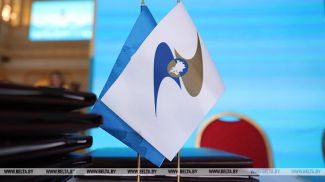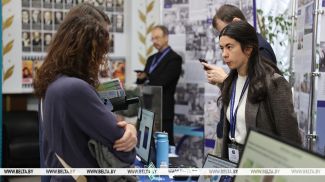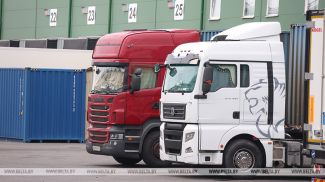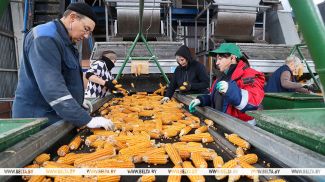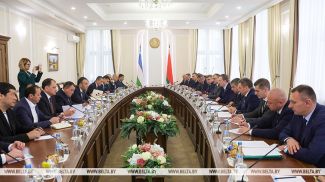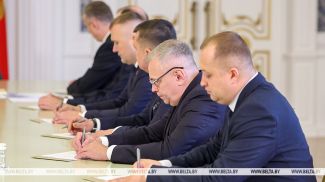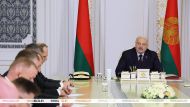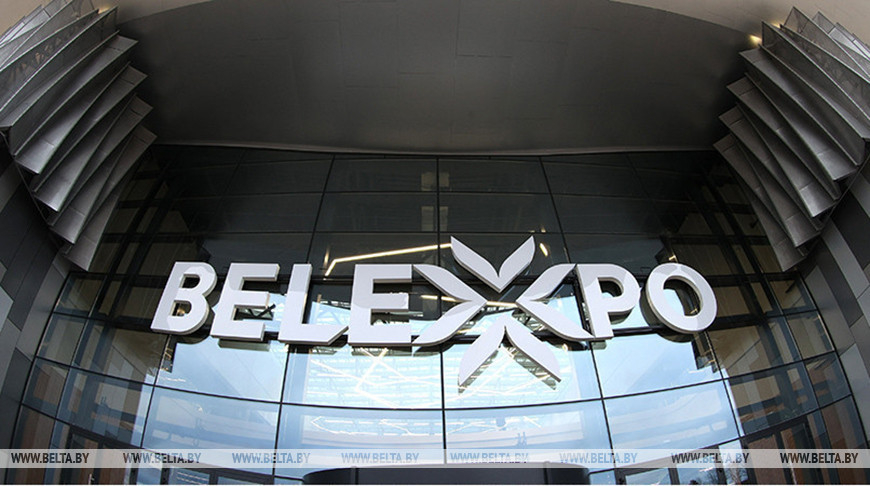
The Minsk International Exhibition Center will host the 4th Eurasian Economic Forum on 26-27 June. The organizers have prepared a versatile and intensive program for the forum’s participants. It covers matters concerning labor, technical regulation, customs cooperation, the advancement of relations in the field of power engineering, private sector, and agriculture. A BelTA reporter took a close look at the program.
Challenges and prospects for the EAEU common labor market
On the first day of the forum, 26 June, participants will focus on discussing challenges and prospects of development of the EAEU common labor market. According to the Eurasian Economic Commission, the implementation of the 2025 Strategy (the strategic guidelines on advancing Eurasian economic integration till 2025) designed to ensure the free movement of labor and promote economic cooperation among EAEU member states in the area of workforce training will contribute to the development of the common labor market in the union since the availability of skilled workers is one of the decisive factors for the sustainable development of economies of the EAEU member states.
Specialists have no doubt that the consistent convergence of workers’ qualifications will lead to increased labor productivity. The development of conditions for the recognition of professional skills in inter-state employment looks promising. In particular, the panel session “Common labor market: Challenges and prospects” of the 4th Eurasian Economic Forum will focus on labor migration in the union and prospects of the subsequent development of the EAEU common labor market. Speakers will include heads of relevant agencies of EAEU member states and representatives of specialized UN agencies, the business community, and public organizations.
Common vector of development of standardization and accreditation
The same day will see sessions of two councils of leaders in the field of technical regulation. Participants of the session of the Council of Heads of State (National) Standardization Bodies of the Eurasian Economic Union member states will discuss systemic issues of development of standardization in the EAEU and the council’s work schedule till 2027.
By the way, the Council of Heads of State (National) Standardization Bodies of the member states of the Eurasian Economic Union was created as an auxiliary body of the EAEU to develop standardization in the union and work out coordinated actions in this area by national standardization bodies. In 2025 the council is chaired by Belarus. The council is headed by Yelena Morgunova, Chairwoman of the State Standardization Committee.
In turn, participants of the session of the Council of Heads of Accreditation Bodies of the Eurasian Economic Union member states intend to consider the implementation of mutual comparative assessments by accreditation bodies and issues concerning the application of results of the work carried out under the IECEE (International Committee for Electrical and Electrotechnical Equipment) scheme to confirm compliance with requirements of the union’s technical regulations. It is a system for the certification of electrical equipment, one of the four conformity assessment systems of the International Electrotechnical Commission (IEC).
This council of heads was established as an auxiliary body of the EAEU to promote accreditation within the union. In 2025 Belarus chairs the council, which is headed by Tatiana Nikolayeva, Director of the Belarusian State Center for Accreditation.
Comprehensive overview of the common electricity market in the EAEU
A session titled as “The EAEU’s common electricity market – a look into the future” is scheduled for 26 June. Participants of the session will discuss topical matters related to the transformation of the energy sectors of the EAEU countries taking into account the rules governing the union’s common electricity market and the degree of readiness of infrastructure organizations to carry out the preliminary steps needed to start the market. Experts will look into peculiarities of development of internal electricity markets of the union’s member states.
The items earmarked for discussion include risks of the EAEU common electricity market in the course of construction of new generation facilities, the formation and development of internal wholesale electricity markets, competition between renewable energy sources and conventional power generation in the context of the common electricity market, and green certificate trading as a potential mechanism for the development of the common electricity market. In addition, prospects and priorities of development of the real sector of the economy and the business community of the EAEU states in the context of the union’s common electricity market and the transformation of energy sectors of the EAEU countries in the context of the functioning of the common electricity market will be discussed.
“In view of rising global energy prices, the decision of the Eurasian G5 to create a common electricity market is rational in order to achieve balanced prices and tariffs on electricity and to achieve growth in the national economies of the EAEU countries,” the Eurasian Economic Commission added. “In 2023-2024 significant progress was made in preparing the regulatory framework for the common electricity market: rules for trading, determining and distributing the capacity of interstate power lines, access to interstate transmission services, and rules for information exchange were adopted.”
An agreement on accession to the common energy market and its regulations are currently being developed. At this stage, according to experts, it is important for infrastructure organizations to be ready to carry out the preparatory measures needed for the market to fully function, which will ensure equal access to cross-border electricity trade and expand the volume and methods of mutual trade, smooth out peak loads in the energy systems of EAEU member states, increase the utilization rate of interstate power lines, and eliminate the need for excessive construction of power generation facilities.
The speakers will be heads of authorized bodies in the field of energy industry, specialized organizations, and stock exchanges of the Eurasian G5. Directors and employees of more than 50 organizations of the electric power industry will participate in the event.
Digital transformation of the customs service
In the context of changing trade flows and global digitalization, it is extremely important for the Eurasian Economic Commission and countries of the Eurasian Economic Union to work together to improve customs administration, introduce breakthrough technologies, modernize border crossings, and develop transit potential, which, specialists believe, will not only speed up customs procedures, but will also enable conditions for the development of the EAEU’s foreign trade relations and for increasing the union’s investment appeal. These and other important aspects of customs cooperation will be discussed at the 4th Eurasian Economic Forum.
Three key customs-related events are supposed to take place as part of the EEF 2025: a panel session on innovations in customs regulation, round tables on the digital transformation of customs authorities, and the development of border crossings as the basis for expanding the union’s transit potential. The events will be moderated by Ruslan Davydov, Member of the Board (Minister) for Customs Cooperation of the Eurasian Economic Commission. Representatives of government agencies of the EAEU countries, the private sector and international organizations, experts in the field of digital economy, and specialists from IT companies have been invited to participate.
Eco-economy - winners of the Green Eurasia competition will receive their awards
On 26 June Minsk will also host a ceremony to award winners and finalists of the third international contest Green Eurasia. This year applications have been submitted from 16 countries: Armenia, Belarus, Bulgaria, India, Iran, Kazakhstan, Kyrgyzstan, China, Moldova, Russia, Senegal, Tajikistan, Turkmenistan, Uzbekistan, Ethiopia, and South Africa.
Expert evaluation and selection of the most efficient solutions for climate mitigation and adaptation were carried out in ten categories: from government practices to educational projects. Members of the presidium of the contest, as clarified by the forum’s organizing committee, noted the high level of applications in terms of how much the technologies and practices were spelled out. Winners and finalists will present their projects in the field of climate technologies, sustainable development, and digital solutions that contribute to the ecological transformation of the economy, and will answer questions and comments from invited experts.
A business dialogue between the EAEU and the UAE
On the sidelines of the 4th Eurasian Economic Forum a joint event will be held with one of the main trading partners of the Eurasian Economic Union among the Persian Gulf countries - the United Arab Emirates. It is timed to coincide with the signing of an economic partnership agreement between the EAEU and the UAE on the sidelines of the Supreme Eurasian Economic Council session. The business dialogue will be attended by representatives of government agencies, business circles, and the expert community of the Eurasian G5 and the UAE and will become a key platform for discussing a trade deal covering more than 90% of the trade turnover and over 85% of the product range. Participants will discuss deeper cooperation and the removal of non-tariff barriers, problems faced by foreign economic operators, ways to expand supply chains, the development of the digital infrastructure, and the involvement of small and medium-sized enterprises in trade on preferential terms.
A session of the advisory council on interaction between the EEC and the EAEU Business Council will also be held. It will be chaired by Bakhyt Sultanov, Member of the Board (Minister) for Economy and Financial Policy of the Eurasian Economic Commission. He chairs the advisory council. The main platform for the dialogue between the EEC and the business community will host discussions on topical matters related to raising awareness of the private sector about the industrial policy tools provided by EAEU legislation, ensuring access of entrepreneurs to state and municipal procurement contracts and developing approaches to intensifying the protection of rights of entrepreneurs.
Eurasian Agroexpress: Expedited delivery of agricultural products
A thematic session dedicated to the Eurasian Agroexpress project is also scheduled. This project offers expedited delivery by rail and multimodal delivery of agricultural products and food both within the EAEU and to third countries. Participants will exchange views on matters of expanding the commodity base and improving trade and logistics efficiency, expanding the geography of agricultural deliveries, and developing infrastructure.
The panel session “Eurasian Agroexpress: New horizons and opportunities” will gather representatives of government agencies and the private sector from the Eurasian Economic Union countries and partner states: Iran, Mongolia, China, the UAE, and India.
Thus, the main theme of the forum will be “The strategy of Eurasian economic integration: Results and prospects.” All areas of cooperation within the EAEU will be covered as much as possible: finance, manufacturing and agriculture, energy industry, technical regulation and veterinary medicine, development of the union’s internal market, trade, transport, customs regulation, public procurement, statistics, and more than that.
The forum’s business program includes a plenary session involving EAEU heads of state and over 30 thematic events: plenary sessions, round tables, and business dialogues. The Eurasian Economic Forum 2025 is expected to be a landmark event for international cooperation in the Eurasian space. Taking part in the action-packed business program will be delegates not only from EAEU countries, but also from observer states: Iran, Cuba, and Uzbekistan. Official delegations from the UAE and Mongolia will also take part in the forum.




